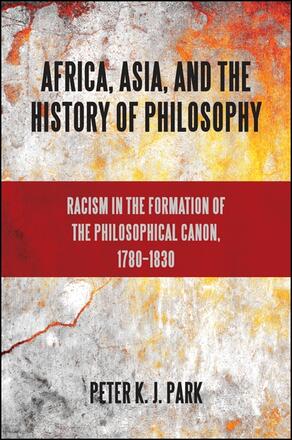
Africa, Asia, and the History of Philosophy
Racism in the Formation of the Philosophical Canon, 1780–1830
Alternative formats available from:
A historical investigation of the exclusion of Africa and Asia from modern histories of philosophy.
Description
Winner of the 2016 Frantz Fanon Prize for Outstanding Book in Caribbean Thought presented by the Caribbean Philosophical Association
In this provocative historiography, Peter K. J. Park provides a penetrating account of a crucial period in the development of philosophy as an academic discipline. During these decades, a number of European philosophers influenced by Immanuel Kant began to formulate the history of philosophy as a march of progress from the Greeks to Kant—a genealogy that supplanted existing accounts beginning in Egypt or Western Asia and at a time when European interest in Sanskrit and Persian literature was flourishing. Not without debate, these traditions were ultimately deemed outside the scope of philosophy and relegated to the study of religion. Park uncovers this debate and recounts the development of an exclusionary canon of philosophy in the decades of the late eighteenth and early nineteenth centuries. To what extent was this exclusion of Africa and Asia a result of the scientization of philosophy? To what extent was it a result of racism?
This book includes the most extensive description available anywhere of Joseph-Marie de Gérando's Histoire comparée des systèmes de philosophie, Friedrich Schlegel's lectures on the history of philosophy, Friedrich Ast's and Thaddä Anselm Rixner's systematic integration of Africa and Asia into the history of philosophy, and the controversy between G. W. F. Hegel and the theologian August Tholuck over "pantheism. "
Peter K. J. Park is Assistant Professor of Historical Studies at the University of Texas at Dallas. He is the coeditor (with Douglas T. McGetchin and Damodar SarDesai) of Sanskrit and 'Orientalism': Indology and Comparative Linguistics in Germany, 1750–1958.
Reviews
"Africa, Asia, and the History of Philosophy is a fascinating study of racism and Eurocentrism in eighteenth century works on history of philosophy. " — Journal of the Society for Contemporary Thought and the Islamicate World
"Now, finally, we have an excellent account of … the exclusion of Asian and African texts from the canon of world philosophy … an acute, critical narrative that should force philosophers to re-examine disreputable pillars of their tradition. " — Chronicle Review
"What makes Park's volume distinctive is the author's proactive approach … Park takes sedulous care in exposing cracks in the history of philosophy's foundation, and digs deeper to examine how each crack is connected … in his reconsideration of the history of philosophy, Park seriously engages the racism still to be found at work in philosophy today. " — Radical Philosophy
"Africa, Asia, and the History of Philosophy is a welcome addition to a neglected area in the history of ideas. Philosophy has long suffered from exclusions that keep us from fully appreciating the contributions to our field from Africa and Asia. Park's book uncovers some of the sources of philosophy's exclusionary practices. The historical detail is impressive. " — Elizabeth Millán, author of Friedrich Schlegel and the Emergence of Romantic Philosophy